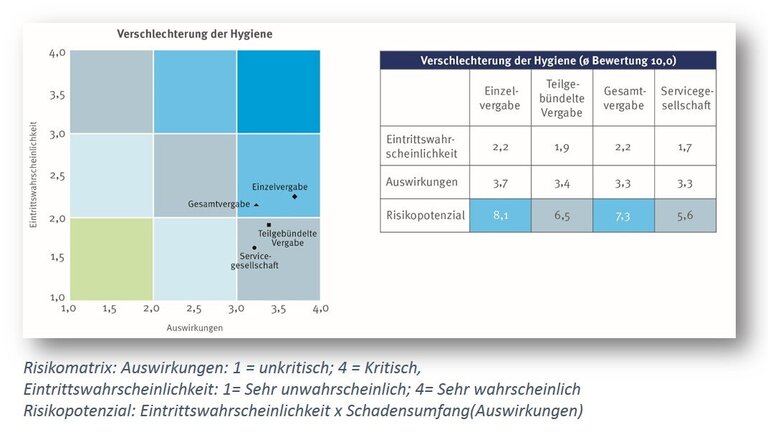Thomas Häusser and Franziska Schönleber provided insights into how, to what extent hospitals commission third party service providers to handle their facility management and how they assess the standard market operator models at the INservFM Tradeshow today. Both work for the international project management and consulting firm Drees & Sommer. Their tradeshow presentation was based on a market analysis that was completed in 2016.
Among other things, the survey addresses the opportunities and risks for hospitals inherent in the assignment of technical and infrastructural FM services to third party providers. Technical services comprise for instance the house and building technology operation as well as its maintenance, while infrastructural services include all user-related services, such as janitorial and postal services, outdoor landscaping or the disposal of medical waste. The individuals in charge of FM at 23 hospitals, 70 percent of them publicly funded, responded to an online services and expert interviews to clarify how hospitals do currently organize these responsibilities and what their concerns are if they use third party providers. The survey focused only on the four most common FM operator models – individual commissioning, partially bundled commissioning, the general contractor model and the service enterprise.
Healthcare Service Availability is Priority One
Häusser explained one issue hospitals have to absolutely guarantee when awarding contracts to external providers making reference to the results of the expert interviews: “In order to be able to guarantee the availability of healthcare services at all times, for the facility management executives interviewed, the secure operation of the building was priority one when choosing a qualified facility management model and the respective service provider.” The survey revealed that the interviewees are particularly nervous about operations relevant risks when awarding contracts. First and foremost, they are concerned about the decline in hygiene, the availability of operations relevant medical and building technical systems as well as the availability of critical media, such as electricity and oxygen. Topics such as operator responsibility, response times, patient satisfaction levels, liability risks, staff demands as well as service management and coordination expenditures were other topics that came up in the survey.
Bundled Services From a Single Source Reduce Risks
Study participants assessed a total of 16 risk classes for the respective operator models with regard to the likelihood of these risks to materialize and their impact on the hospital’s core processes. Based on the responders’ evaluation, the service company and bundled contract award models are the least risky. The reason: The more centralized the provision of the FM services and the lower the number of service interfaces, the fewer risks normally arise for the operation of the hospital. On the other hand, the interviewees rated the common individual commissioning practice as the model with the highest risk potential. As part of this model, individual services are usually assigned in small portions to the respective third party service providers. Compared to other operator models, this results in higher management and coordination expenditures as well as significantly more interfaces in day-to-day operations. Despite these disadvantages, individual commissioning is still the most commonly used operator model between in-house and third party services.
“Hence, reviewing their current contract awards structure and devising suitable action will pay off for hospitals. While there is awareness that the building operations should be optimally organized also taking into account the risks and costs, to date, these services are rarely bundled prior to being assigned to third party providers. Hence, the in-house management costs are still comparatively high,” Häusser comments as he reviews the results of the study. In the opinion of the study participants, the direct influence and intervention rights are at the highest level if a hospital outsources its facility management to a service or investment company with or without third party involvement. The bundled contract awards model is a similar operator model.
To Date, Hospitals Bet on In-house Control
According to the survey, the individuals in charge of FM do prefer third party assignments for assignments that are not directly affiliated with the hospital’s core business. However, if services are closely linked to the core process, the hospital – even today – still handles these directly or makes individual assignments for parts of these services. This includes, for instance, the cleaning of surgery suites or the operation of medical technical systems. Likewise, services that include hospital specific demands are more frequently provided in-house. This includes primarily the staff intensive operation of technical systems.
By comparison, services that can be easily distinguished from the core business, are already being outsourced at a higher percentage rate. The reasons for the increased external support besides costs are also the attainment of greater staffing resource flexibility and the complete or partial delegation of the operational responsibilities.
